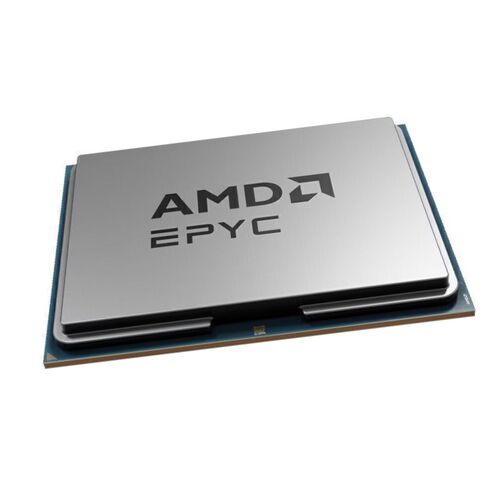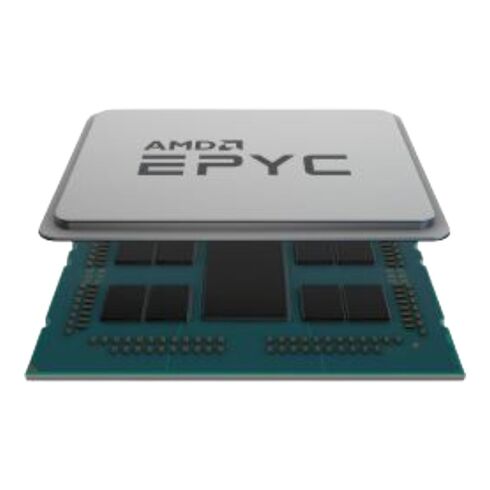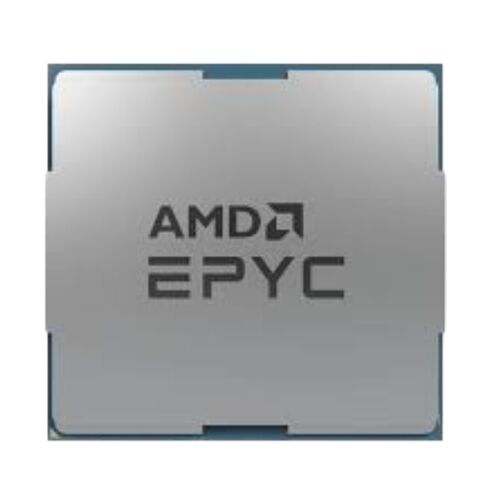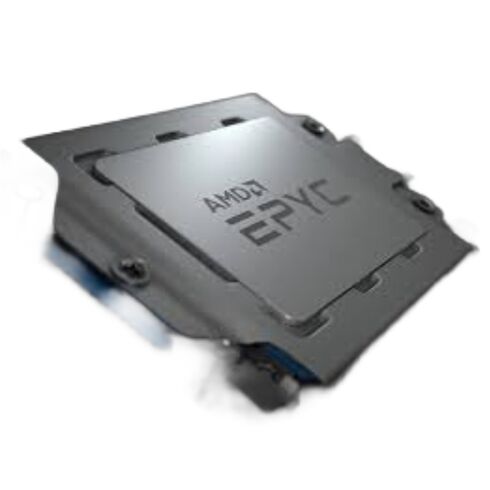P54060-001 HPE AMD EPYC 9174f 16-core 256MB L3 4.1 GHz Processor
- — Free Ground Shipping
- — Min. 6-month Replacement Warranty
- — Genuine/Authentic Products
- — Easy Return and Exchange
- — Different Payment Methods
- — Best Price
- — We Guarantee Price Matching
- — Tax-Exempt Facilities
- — 24/7 Live Chat, Phone Support
- — Visa, MasterCard, Discover, and Amex
- — JCB, Diners Club, UnionPay
- — PayPal, ACH/Bank Transfer (11% Off)
- — Apple Pay, Amazon Pay, Google Pay
- — Buy Now, Pay Later - Affirm, Afterpay
- — GOV/EDU/Institutions PO's Accepted
- — Invoices
- — Deliver Anywhere
- — Express Delivery in the USA and Worldwide
- — Ship to -APO -FPO
- — For USA - Free Ground Shipping
- — Worldwide - from $30
Product Overview Of HPE P54060-001
- Manufacturer: HPE
- Model Number / SKU: P54060-001
- Product Type: Server Processor
- Processor Model: EPYC 9174f
Processor Specifications
Core and Speed Details
- Core Count: 16 cores
- Base Clock Speed: 4.1 GHz
- Maximum Boost Clock: Up to 4.4 GHz
Memory and Cache
- L3 Cache Capacity: 256 MB
- Memory Type Supported: DDR5
- Memory Channels: 12 channels for high bandwidth
- Maximum Memory Speed: Up to 4800 MHz
- Per Socket Memory Bandwidth: 460.8 GB/s
Thermal and Power Specifications
- Thermal Design Power (TDP): 320W
- Processor Socket Compatibility: SP5 socket
Key Technical Advantages of the HPE P54060-001
Multi-Core Performance
The EPYC 9174f processor's 16-core design ensures efficient processing power, suitable for high-demand server applications and multi-threaded tasks.
Advanced Cache System
Equipped with a 256MB L3 cache, this processor delivers faster data access, reducing latency in complex computing scenarios.
High-Speed Memory Support
- DDR5 Memory Compatibility: Enhanced data rates and stability with support for DDR5, achieving memory speeds of up to 4800 MHz.
- 12 Memory Channels: Expanded bandwidth for intensive data processing.
Optimized Power and Thermal Management
- Default TDP: Designed for efficient power consumption at 320W.
- Socket SP5 Compatibility: Seamlessly integrates with SP5, allowing robust server deployments.
Cores
The AMD EPYC 9174f Processor is designed with an impressive 16 cores, making it a powerhouse for demanding workloads. With each core capable of executing multiple tasks simultaneously, this processor provides exceptional performance and efficiency.
Enhanced Multi-Tasking
Having 16 cores means that the AMD EPYC 9174f Processor can handle a multitude of tasks simultaneously without sacrificing performance. Whether you are running complex simulations, handling massive databases, or running multiple virtual machines, this processor ensures smooth and seamless multitasking. Users can experience improved productivity and responsiveness, as the processor effortlessly handles resource-intensive applications.
Optimized Workloads
The high number of cores in the AMD EPYC 9174f Processor allows for efficient workload distribution. Each core can be assigned specific tasks, ensuring optimal utilization of resources and minimizing processing bottlenecks. This feature is particularly beneficial for applications that require parallel processing, such as scientific simulations, video rendering, and data analytics. Users can expect faster processing times and improved overall system performance.
Scalability and Future-Proofing
With 16 cores, the AMD EPYC 9174f Processor offers scalability for future growth. As software becomes more demanding and workloads increase in complexity, having additional cores provides headroom for expansion without the need for a complete hardware upgrade. Users can easily scale their operations, accommodating evolving business needs and staying ahead of the competition.
Power Efficiency
Despite its high core count, the AMD EPYC 9174f Processor is designed to be power-efficient. The processor utilizes advanced power management features to optimize energy consumption while maintaining peak performance. This not only reduces operational costs but also contributes to a more sustainable computing environment.
Virtualization Performance
For users leveraging virtualization technology, the 16 cores of the AMD EPYC 9174f Processor offer significant advantages. Virtual machines can be allocated dedicated cores, ensuring isolated and efficient processing of each virtual environment. This feature enhances the overall performance and stability of virtualized systems, enabling organizations to run multiple applications seamlessly.
Competitive Advantage
The 16-core configuration of the AMD EPYC 9174f Processor provides a competitive edge in industries that rely on high-performance computing. Whether it's scientific research, financial modeling, or content creation, having more cores means faster completion of tasks and quicker time to market. Users can gain a significant advantage over their competitors by harnessing the power of this processor.
Conclusion
In summary, the AMD EPYC 9174f Processor's 16 cores offer enhanced multitasking capabilities, optimized workload distribution, scalability for future growth, power efficiency, improved virtualization performance, and a competitive edge for users in various industries. With its robust processing power and efficient resource utilization, this processor is a reliable choice for demanding workloads that require exceptional performance and productivity.
Cache
The AMD EPYC 9174f Processor features an impressive 256MB L3 cache, providing fast access to frequently used data and instructions. The cache plays a crucial role in enhancing overall system performance by reducing memory latency and improving data retrieval speeds.
Reduced Memory Latency
The large L3 cache of the AMD EPYC 9174f Processor reduces memory latency by storing frequently accessed data closer to the cores. This ensures that the processor can quickly retrieve information without relying heavily on slower external memory. As a result, applications experience reduced wait times for data access, leading to improved responsiveness and smoother operation.
Faster Data Retrieval
With its substantial L3 cache size, the AMD EPYC 9174f Processor can store a significant amount of data and instructions. This allows the processor to retrieve frequently accessed information quickly, without the need to access external memory. The result is faster execution of tasks, especially those that rely on repetitive data access, such as database queries or complex calculations. Users can experience a noticeable improvement in application performance and overall system responsiveness.
Improved Instruction Throughput
The large L3 cache enables the AMD EPYC 9174f Processor to store frequently used instructions, reducing the need for repeated instruction fetches from memory. This improves instruction throughput, as the processor can execute instructions without waiting for their retrieval. Applications that heavily rely on instruction execution, such as compilers or complex algorithms, can benefit greatly from this feature. Users can expect faster program execution and reduced processing times.
Enhanced Multithreaded Performance
For multithreaded applications, the generous L3 cache size of the AMD EPYC 9174f Processor provides a significant advantage. Each thread can access a dedicated portion of the cache, minimizing contention and improving overall performance. This feature is particularly beneficial for tasks that require concurrent data access, such as video editing or rendering. Users can achieve faster rendering times and smoother multitasking capabilities.
Improving Gaming Experience
The large L3 cache also benefits gaming enthusiasts by reducing loading times and improving in-game performance. Game assets and textures can be stored in the cache, allowing for quicker retrieval during gameplay. This results in reduced stuttering, smoother frame rates, and an overall enhanced gaming experience.
Boosted Productivity
The AMD EPYC 9174f Processor's substantial L3 cache contributes to improved productivity in various scenarios. Whether it's data analysis, content creation, or scientific simulations, users can experience faster processing times and reduced waiting periods for data access. This translates to increased efficiency and productivity, enabling users to accomplish more in less time.
Conclusion
In conclusion, the AMD EPYC 9174f Processor's 256MB L3 cache provides reduced memory latency, faster data retrieval, improved instruction throughput, enhanced multithreaded performance, and an overall improved user experience. Whether it's reducing wait times, accelerating application performance, or boosting productivity, the cache plays a vital role in optimizing system performance and ensuring a smooth computing experience.
Power
The AMD EPYC 9174f Processor delivers a robust power performance with its 320-watt power rating. This feature is essential for users who require high-performance computing capabilities while ensuring reliability and stability in their systems.
Uncompromised Performance
With a power rating of 320 watts, the AMD EPYC 9174f Processor can deliver exceptional performance without compromising on stability or reliability. The processor can handle resource-intensive tasks effortlessly, ensuring smooth execution of demanding applications. Users can rely on this processor to provide consistent and reliable performance, even under heavy workloads.
Seamless Multitasking
The high power rating of the AMD EPYC 9174f Processor enables it to handle multiple tasks simultaneously without experiencing performance degradation. Whether you are running multiple virtual machines or handling complex calculations, this processor ensures seamless multitasking capabilities. Users can switch between applications effortlessly and experience minimal slowdowns, enhancing productivity and efficiency.
Optimized Power Management
Despite its high power rating, the AMD EPYC 9174f Processor incorporates advanced power management features to optimize energy consumption. The processor intelligently adjusts its power usage based on workload requirements, ensuring efficient utilization without excessive energy consumption. This not only reduces operational costs but also contributes to a more sustainable computing environment.
Reliability and Stability
The 320-watt power rating of the AMD EPYC 9174f Processor ensures stable and reliable operation even under heavy workloads. The processor is designed to handle demanding applications without compromising on performance or system stability. Users can rely on this processor for mission-critical tasks that require uninterrupted operation.
Future-Proofing
The high power rating of the AMD EPYC 9174f Processor provides headroom for future growth and scalability. As software and workloads become more demanding, having a processor with ample power ensures that users can accommodate evolving needs without requiring a complete hardware upgrade. This feature contributes to long-term cost savings and ensures that users can stay competitive in an ever-changing technological landscape.
Cooling Considerations
Given its power rating, it is essential to consider appropriate cooling solutions when using the AMD EPYC 9174f Processor. Efficient cooling mechanisms, such as liquid cooling or high-performance air cooling, are recommended to maintain optimal operating temperatures and prevent thermal throttling. Users should ensure that their system's cooling capabilities match the processor's power requirements for optimal performance and longevity.
Conclusion
In conclusion, the AMD EPYC 9174f Processor's 320-watt power rating offers uncompromised performance, seamless multitasking, optimized power management, reliability and stability, future-proofing capabilities, and cooling considerations. Whether it's handling resource-intensive tasks, ensuring system stability, or preparing for future growth, this processor delivers the power required for demanding workloads while maintaining efficiency and reliability.
Speed
The AMD EPYC 9174f Processor boasts an impressive clock speed of 4.1 GHz, providing exceptional processing power for a wide range of applications. The high clock speed ensures speedy execution of tasks, making it ideal for users who require fast and responsive computing capabilities.
Quick Task Execution
With a clock speed of 4.1 GHz, the AMD EPYC 9174f Processor excels at quickly executing tasks. The high frequency allows for faster processing of instructions, reducing overall processing times. Whether it's running complex algorithms, compiling code, or rendering videos, users can experience significantly improved task execution speed, leading to enhanced productivity and reduced waiting periods.
Responsive Applications
The high clock speed of the AMD EPYC 9174f Processor contributes to highly responsive applications. Applications load faster, respond quickly to user input, and provide a seamless user experience. This is particularly beneficial for tasks that require real-time interaction, such as video editing or gaming. Users can enjoy smoother operation and reduced lag, resulting in an overall more enjoyable computing experience.
Single-Threaded Performance
The AMD EPYC 9174f Processor's high clock speed translates to excellent single-threaded performance. Single-threaded applications benefit from the processor's ability to execute instructions quickly, resulting in faster program execution and improved responsiveness. Users can expect snappy performance in applications such as web browsing, office productivity, and lightweight software.
Multi-Core Performance
While the clock speed primarily influences single-threaded performance, the AMD EPYC 9174f Processor's high clock speed also benefits multi-core applications. With 16 cores operating at 4.1 GHz, users can experience exceptional multi-core performance. This feature is particularly advantageous for tasks that can take advantage of parallel processing, such as video rendering or scientific simulations. Users can achieve faster processing times and improved overall system performance.
Overclocking Potential
For users seeking additional performance, the high base clock speed of the AMD EPYC 9174f Processor provides a solid foundation for overclocking. Overclocking allows users to push the processor beyond its default clock speed, further enhancing performance. However, it is important to note that overclocking may require additional cooling solutions and careful consideration of system stability. Users should ensure proper cooling and take necessary precautions when attempting to overclock the processor.
Efficient Resource Utilization
The AMD EPYC 9174f Processor's high clock speed contributes to efficient resource utilization. Applications can execute instructions quickly, ensuring that system resources are utilized effectively. This translates to improved overall system performance and responsiveness, enabling users to accomplish more in less time.
Conclusion
In conclusion, the AMD EPYC 9174f Processor's clock speed of 4.1 GHz offers quick task execution, responsive applications, excellent single-threaded and multi-core performance, overclocking potential, and efficient resource utilization. Whether it's demanding workloads, real-time applications, or maximizing system performance, this processor's high clock speed delivers the processing power required for fast and responsive computing.
Part Number
The AMD EPYC 9174f Processor is identified by its unique part number: P54060-001. This part number serves as a specific identifier for the processor model and helps users identify and differentiate it from other processors in the market.
Easy Identification
The part number, P54060-001, provides a simple and straightforward way to identify the AMD EPYC 9174f Processor. Whether you are purchasing the processor or looking for technical support, having a unique part number ensures that you can easily communicate the specific model you are referring to. This eliminates any confusion or ambiguity that may arise when identifying processors solely by their names or specifications.
Compatibility Assurance
The part number also ensures compatibility assurance when selecting compatible hardware components or software applications. Manufacturers and vendors often provide compatibility lists or documentation that specify supported processor models using part numbers. By referencing the part number, users can be confident that the AMD EPYC 9174f Processor is compatible with their existing or desired system configurations.
Identifying Features
The part number, P54060-001, may also provide valuable information about the processor's specific features or variations. Manufacturers sometimes incorporate specific codes or digits within the part number to denote certain characteristics or revisions. Users can refer to official documentation or product specifications to decode these variations and gain insights into specific features or improvements associated with their processor model.
Warranty and Support
The part number is often required when seeking warranty claims or technical support for the AMD EPYC 9174f Processor. Manufacturers and vendors use this unique identifier to verify product ownership, determine warranty eligibility, and provide appropriate support. Users should ensure that they keep their part number information readily accessible for any future support needs.
Product Differentiation
As processors evolve and new models are introduced, having a unique part number becomes crucial for product differentiation. The part number allows users to distinguish between different processor models and identify the specific features and capabilities associated with each one. This information is vital when comparing processors or making informed purchasing decisions based on specific requirements.
Future Reference
The part number serves as a valuable reference point for future upgrades or replacements. Users can easily identify the exact model they are currently using and refer to it when considering system upgrades or replacements. This ensures compatibility and helps users make informed decisions based on their existing system configurations.
Conclusion
In conclusion, the AMD EPYC 9174f Processor's part number, P54060-001, provides easy identification, compatibility assurance, insights into identifying features, warranty and support verification, product differentiation, and future reference benefits. By leveraging the unique part number of the processor, users can confidently identify, differentiate, and utilize the AMD EPYC 9174f Processor in their computing systems.













